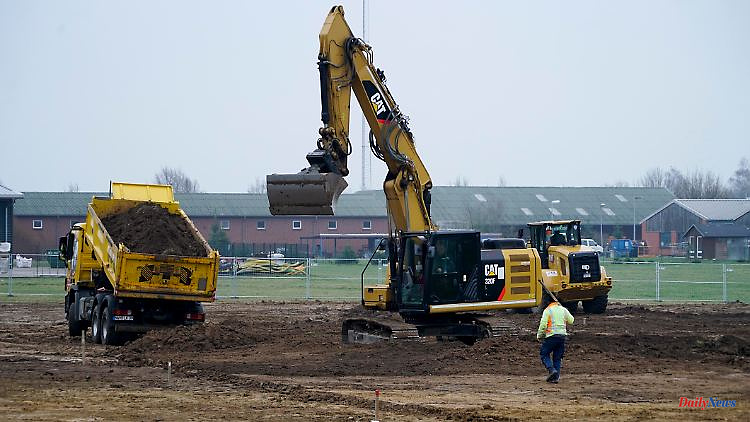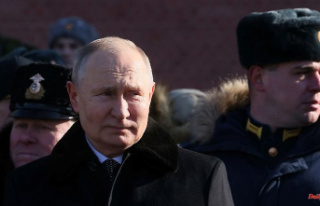States and municipalities feel overburdened by the increased number of refugees and are demanding more money from Berlin. The managing director of the Mecklenburg-Western Pomeranian Refugee Council, Ulrike Seemann-Katz, also insists. However, she also sees that the burdens caused by refugees are still seen primarily, not the existing gains.
ntv.de: Are the municipalities overwhelmed with taking in refugees?
Ulrike Seemann-Katz: In my opinion, they are not overwhelmed. All we really have to do is accommodate differently, then things would be much easier. From about 100 to 150 people, the operation of an accommodation becomes economical. So you don't have to accommodate 400 people somewhere, 100 to 150 are enough. It would be even better to house people in apartments. There is a lot of vacancy in rural areas, including in the communities. If the refugees were accommodated there in apartments, things would be easier. The decentralized accommodation also saves money, for example for security services, fences and the resulting community facilities. This money can then be invested in support staff who provide advice and care on a quasi-visiting basis. This already exists in individual districts, and I think it's very good.
How is the situation in Mecklenburg-Western Pomerania anyway? How many refugees does the country take in?
According to the Königstein key, the country must take in two percent of the refugees arriving in Germany. There are currently 586 [January 2023, source: BAMF, note from the Red.]. These are then distributed to the districts according to the so-called immigration responsibility state regulation. Unlike the Königstein key, this ordinance is not based on economic strength and the number of inhabitants, but only on the number of inhabitants and the existing proportion of foreigners. This means that a district in which many foreigners already live will be assigned fewer refugees. The district of Northwest Mecklenburg, for example, does not get that many because the Hanseatic city of Wismar already has a higher proportion of foreigners.
In Upahl in the Northwest Mecklenburg district there are protests against a refugee shelter where around 400 refugees are said to live. The place has a little more than 500 inhabitants. What triggers this rejection? The decision itself or the numerical ratio?
The accommodation doesn't evoke horror or fear in everyone. But for many, that fear is subliminal. This is partly due to the fact that it is invoked in media reports. And there are people who take advantage of this and stir up fears because they derive their right to exist from it. The AfD, for example, hopes that this will attract more people. Psychologically, many people are afraid of the unknown. Not all, by the way. Some people get curious too.
You recommended one-on-one talks with the locals in Upahl instead of a citizens' meeting, which eventually took place. Why?
These large gatherings lead to tumult rather than factual argument. As a politician and as a decision-maker, you can no longer really take people's fears seriously, because sometimes very crude stuff comes up. That child soldiers are sent to exterminate the German race, for example.
How much contributes to the fact that the municipalities and the federal states are vehemently demanding more money from the federal government for the care of refugees?
That also plays a big role. In Mecklenburg-Western Pomerania, the municipalities get paid for everything anyway. The Refugee Admissions Act states that the state reimburses the municipalities for all necessary costs. Everything that a municipality has previously agreed with the state as necessary is paid for at 100 percent. It is even a blessing for the municipalities, because there are allocations from the municipal financial equalization for each inhabitant. At the moment it's around 1000 euros. If a municipality doubles the number of its residents, it also receives double the number of so-called key allocations. So you can also win as a municipality by taking in refugees. However, the burden is always discussed.
But this money has to come from somewhere.
The money for the recording must come from the federal government and even more than before. Perhaps the federal government has not yet fully understood that there is much more to it than just admission and accommodation. Of course, this also includes integration. And the federal government really needs to invest more, especially in the training of German teachers. That's actually a matter for the federal states, but that's where we have the biggest problem at the moment: that they don't exist and that there are no daycare staff.
The district administrator responsible for Upahl also argues that he does not have enough social workers for smaller facilities.
That's the problem. More needs to be done for training. In the current emergency, one could also lower standards and work with further training and qualification. You might not need a formal qualification for that, you can also continue your education alongside your job.
It is now assumed that many refugees will stay here. This means that not only emergency accommodation is needed, but also apartments, daycare places and school places.
We are a rich country and we are partly the reason why people flee - if I think about issues like climate change, weapons production or things like that. We haven't thought for years, actually for decades, that we are an immigration country. But that's actually what we are, and we also need this immigration. When it came to normal professional immigration, we didn't think of the families who might want to come with us. We often didn't think about the topic of integration at all. To date, it has been difficult to get language courses for EU citizens, or even set them up at all. It's a question of attitude in society.
You sound like money is the least of your problems.
That's how I see it, yes. We have standards for the reception and accommodation of refugees. For this we need openness and flexibility, you could also let the refugees themselves have a say. We talk about these people all the time, it doesn't leave them untouched.
When a refugee summit takes place and the chancellor doesn't attend, what kind of sign does that give you?
That's not important enough. Yes, I would actually say that at this point. And that this is mainly about money between the countries and the Ministry of the Interior and by no means about any standards or improvements or about people. For me, the fact that these working groups were set up is just a sign that they wanted to pretend that they had achieved something.
Solveig Bach spoke to Ulrike Seemann-Katz












